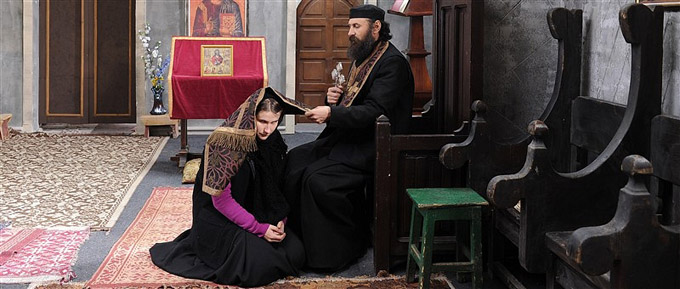Title: Beyond the Hills
Director: Cristian Mungiu
Starring: Cristina Flutur, Cosmina Stratan, Valeriu Andriuta
Cristian Mungiu is the most well-known figure inside of the Romanian New Wave, and justifiably so. Mungiu is unwilling to compromise with the audience and even with himself, in spite of the subject matter being too difficult to talk about (let alone watch), and his ability to probe the minds and hearts of each and every character makes him a riveting director with enormous potential. In 2007, 4 Months, 3 Weeks, and 2 Days was his second feature film that set Cannes ablaze with his powerful take on Romania’s abortion issue, ultimately winning the prestigious Palme d’Or; now with his newest film, Beyond the Hills, he takes his directorial ability to the issue of religion in present-day Romania. Based on real events of an exorcism that went horribly awry, he carries over the same social realist aesthetic that worked to such great effect in 4 Months. Beyond doesn’t have the same tight-rope walking suspense and eviscerating quality, but it does continue his blossoming oeuvre in such a subversive way that it’s difficult to not be somewhat enamored by his risk taking, however flawed it might be.
Beyond the Hills tells the story of two young girls who grew up in the same orphanage, Alina (Cristina Flutur) and Voichita (Cosmina Stratan). They shared a strong bond when they were young, where they began as friends, but as they matured they became sexually active with one another. Eventually they chose two separate lives; Alina is a barmaid while Voichita resides in an Orthodox convent in Moldavia. Unable to stay away any longer, Alina decides to join her in spite of her areligious lifestyle. It’s immediately telling when watching them reunite that it’s not as Alina wants, as Voichita has now found God and no longer wishes to pursue a romantic relationship with Alina. Cristina and Cosmina are absolutely wonderful together. Cristina, especially, gives a tour de force as the wildly depressed Alina, while Cosmina, on the other side, gives a far more reserved performance that simmers with self-doubt and uncertainty.
Mungiu is obviously concerned about religion’s place in modern day society. Early in the film, the “Father” (each member is either referred to as a “Father” or “Mother) of the convent questions the church’s place in present day Western Europe. “Western Europe has lost its way”, he says with great sincerity. This becomes the chief subtext within the film. As Alina’s condition worsens, the convent comes to believe that she is possessed by Satan. While 4 Months consisted of the same minimalist approach and executed it flawlessly, Beyond suffers because of it. During the second act, it begins to trail off into repetition and tedium that deprive the film of its power. Essentially, the film plays the same note throughout its run time with little break in between. Because it suffers from a thin plot, the subtext also suffers since it is brought to the surface. Mungiu seems to be taking a step back, as opposed to moving forward into deeper complexity.
Romania continues to be a prevalent theme in his work, even in his first film Occident, which was a tragicomedy that told the story of immigration from Romania to other countries for work. Even still, it was situated in his homeland. Mungiu obviously has a unique relationship with his country, in the sense that he both loves it and is deeply troubled by its problems. Overall, Beyond is much lighter (although that means very little) in tone and even more sparse in its plot. It’s no less thoughtful, however. Mungiu contemplates each and every movement and scene with tremendous care and meticulousness. Much more could have been done with Alina and Voichita, and in the end it feels like the journey hasn’t been quite as rewarding and memorable as 4 Months. But what does salvage the film is that it’s based on a true story; it’s unnerving enough as an idea. Beyond the Hills does have a haunting ending that left me thoughtful and more than a little unnerved. It isn’t a perfect film, but one that warrants ample discussion nonetheless.
Technical: A
Acting: B+
Story: C
Overall: B-

